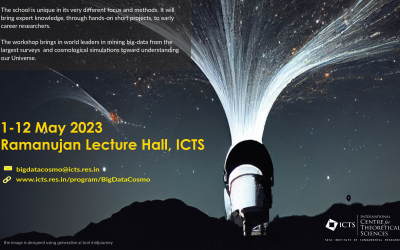The tremendous success of Cosmic Microwave Background (CMB) observations, by WMAP and Planck, have heralded an era in precision cosmology. The large scale structures (LSS) in our Universe, particularly at low redshifts, have also been mapped out in great detail over the last decade by surveys such as SDSS. Ongoing surveys such as the DES, KiDS and HSC are pushing this frontier to higher redshifts. The near future will see further advances with DESI, PFS, Euclid and LSST continuing the legacy of wide area surveys. We will also get data in X-ray from eROSITA, and 21 cm surveys such as CHIME and BINGO followed by SKA in the not so far future. Hand-in-hand, the next generation CMB S4, CMB-HD observations are on the cards; especially CMB polarization and spectral distortion experiments would provide an unprecedented view of the early Universe allowing us to look far beyond the last scattering surface.
The proposed program aims to :
- Expose young researchers to the forefront of Cosmology research in the areas that are poised to dominate the field in the next decade.
- Initiate, strengthen and extend collaborations between active early career scientists with the researchers from the top-most CMB and LSS research groups.
- Develop the necessary skills to use publicly available data to do cutting edge cosmology research.
This program is aimed to be unique by its very different focus and methods. It will bring expert knowledge, through hands-on short projects, to early career researchers who are poised to grasp complex details of multi-messenger cosmology. The key idea is to provide the very valuable `insider insight’ which is crucial when working with large survey data. We will also have a strong focus on presenting complex ideas effectively by various talks students will have to give during the two weeks period.
This program is divided in two parts which require separate registrations:
1) School (1 - 8 May 2023): During this part of the program participants will get to work on exciting projects of their choice with experts.
You must register before 26th March by completing the application from. The list of available projects and application form for the school can be accessed from the menu on the top right corner.
Application deadline for School - 26 March 2023
2) Workshop (9 - 12 May 2023): During this part of the program we will have discussion on frontier topic via talks and discussion sessions. You must register before 30th March by filling the following application form for the workshop given in top right corner menu.
Application deadline for Workshop - 30 March 2023
Eligibility Criteria for School: Research scholars already registered for Ph.D. (under a supervisor) or working as post doctoral researchers are eligible to apply provided the applicant's area of research overlaps with the main topics of this program. A strong aptitude for computational work will be an added advantage in the application.
ICTS is committed to building an environment that is inclusive, non discriminatory and welcoming of diverse individuals. We especially encourage the participation of women and other under-represented groups.
 icts
icts res
res in
in

